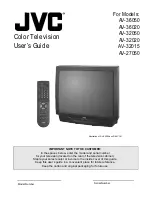
E
Important Safety Instructions
If you have a cardiac pacemaker, keep a
distance of at least 22 cm from the TV. Radio
waves may interfere with the operation of a
pacemaker.
Built-in wireless LAN
- Do not connect to wireless networks
that you do not have the usage rights
for. Data transmitted and received over
radio waves may be intercepted and
monitored.
The built-in wireless LAN uses 2.4 GHz
and 5 GHz frequency bands. To avoid
malfunctions or slow response caused by
radio wave interference, keep the TV away
from devices such as other wireless LAN
devices, microwaves, mobile phones, and
other devices that use 2.4 GHz and 5 GHz
signals.
Warning about off-gassing
New furniture, carpet, paint, building
materials and electronics can release
chemicals into the air through evaporation.
After you set your TV up and turn it on for
the first time, you may notice a slight smell
within a couple of hours. This is because
some components of TV are heating up
for the first time. The materials that we use
fully meet the environmental requirements
and regulations. Your TV is working just
fine and the fumes from the off-gassing
will diminish eventually.
Supervision
- Do not let children play unsupervised
close to the TV. It could tip over, be
pushed off or pulled down from the
stand surface and injure someone.
- Do not allow a switched-on TV to run
unattended.
Volume
Loud music and noises can lead to
irreversible damage to your ears. Avoid
extreme volume, especially over long
periods and when using headphones.
If you hear a drumming noise in your ears,
turn down the volume or temporarily stop
using headphones.
Thunder Storms
Pull out the power plug and all connected
antenna cables from the TV during a
thunderstorm. Overvoltage caused by
lightning strikes can damage the TV via
the antenna system, as well as the wall
socket.
Long periods of absence
As long as the power plug is connected to
a live socket outlet, the TV will consume
power even in standby mode. The power
plug and all connected antenna cables
should be disconnected out during long
periods of absence.








































